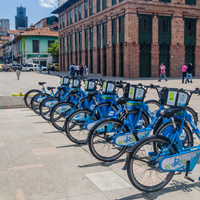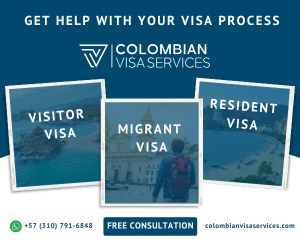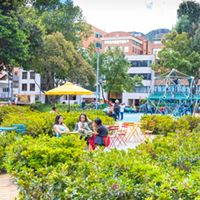Digital Nomad Life in Cartagena, Colombia
Summary: Cali, Colombia is a popular destination for digital nomads due to its low cost of living, vibrant culture, and excellent infrastructure. The city has a population of approximately 2.5 million people. The monthly cost of living for a digital nomad in Cali is estimated to be around $1,000 USD. The cost of renting a centrally located, one-bedroom apartment with high-speed internet access in Cali is approximately $400 USD per month. The best neighborhood to live in Cali is El Peñon, which is known for its vibrant nightlife, excellent restaurants, and close proximity to the city center. The weather in Cali, Colombia is typically warm and humid, with temperatures ranging from the mid-60s to the mid-80s Fahrenheit.
How do I meet people in Cartagena?
When we asked people living in Cartagena about club and activities where newcomers can meet others, they responded:
"Expats in Cartagena often join various clubs and activities to meet new people and immerse themselves in the local culture. These include language exchange groups, where they can practice their Spanish and help locals with English. They also participate in cooking classes to learn about traditional Colombian cuisine, or join dance classes to learn popular Latin dances like salsa and bachata. There are also several sports clubs and gyms in Cartagena that attract expats, such as yoga studios, CrossFit boxes, and soccer clubs. These provide a great opportunity to stay active and meet locals and other expats with similar interests. In addition to clubs and activities, expats often meet people through volunteering. There are numerous organizations in Cartagena that welcome the help of foreigners, from teaching English to helping with community development projects. This not only allows expats to give back to their new community, but also to form meaningful connections with locals. Networking events and social gatherings are another way for expats to meet people in Cartagena. These can range from professional networking events organized by local business associations, to casual meetups arranged by expat groups on social media. Finally, simply exploring the city and frequenting local cafes, markets, and festivals can lead to chance encounters and new friendships. Cartagena is known for its friendly and welcoming locals, so expats often find that striking up a conversation with a stranger can lead to a lasting connection," explained one person living in Cartagena, Colombia.
What is life like in Cartagena?
When we asked people living in Cartagena what life is like and how people spend their time, they said:
"Life for expats and digital nomads in Cartagena is vibrant and exciting, with a rich culture and history to explore. The city is known for its beautiful colonial architecture, lively music scene, and delicious local cuisine. The cost of living is relatively low, making it an attractive destination for those looking to live and work abroad. The city is also quite modern, with reliable internet and plenty of coworking spaces, making it easy for digital nomads to work. The locals are friendly and welcoming, and while Spanish is the main language, English is also widely spoken, especially in the tourist areas. The weather in Cartagena is tropical, with warm temperatures year-round, perfect for those who enjoy the heat. The city is also located on the Caribbean coast, offering beautiful beaches and a variety of water sports. Despite its many advantages, life in Cartagena also has its challenges. The city can be quite crowded, especially during peak tourist season, and traffic can be heavy. Safety can also be a concern, especially at night, and it's important for expats and digital nomads to take precautions and stay aware of their surroundings. Overall, life for expats and digital nomads in Cartagena offers a unique blend of cultural immersion, adventure, and the opportunity to enjoy a relaxed lifestyle in a beautiful setting," said one person in Cartagena.
Where should I live in Cartagena?
We asked digital nomads and expats how they chose their neighborhood and found a place to live. They answered:
"Finding a place to live in Cartagena involves several steps. First, you need to determine your budget and the type of accommodation you're looking for. This could range from a small apartment to a larger house, depending on your needs and financial situation. Next, you should research the different neighborhoods in Cartagena to find one that suits your lifestyle and preferences. Some popular areas include the historic Old Town, the trendy Getsemani, and the upscale Bocagrande. Once you have a general idea of where you'd like to live, you can start searching for available properties. There are several online platforms that list rentals and properties for sale in Cartagena, such as fincaraiz.com.co, metrocuadrado.com, and compreoalquile.com. You can also consider hiring a local real estate agent to help you in your search. They can provide valuable insight into the local market, help negotiate prices, and guide you through the legal process of renting or buying a property in Colombia. When you find a property you're interested in, be sure to visit it in person before making any commitments. Check the condition of the property, the amenities, and the surrounding area to make sure it meets your expectations. Finally, once you've found the perfect place, you'll need to sign a lease or purchase agreement. Be sure to read the contract carefully and understand all the terms before signing. If you're not fluent in Spanish, you might want to hire a translator or lawyer to help you understand the contract. Remember, finding a place to live in a new city can take time, so be patient and don't rush the process. With careful planning and research, you'll be able to find a great place to live in Cartagena," remarked one foreigner who made the move to Cartagena.
What do I need to know before moving to Cartagena?
When we asked people what advice they would give someone preparing to move to Cartagena, they said:
"Before retiring in Cartagena, expats should know that the cost of living is relatively low compared to many Western countries, making it an attractive option for retirees. However, healthcare can be a concern, as the quality varies greatly and private health insurance is recommended. Expats should also be aware that while many locals speak English, it is not widely spoken outside of tourist areas, so learning Spanish can greatly enhance your experience. Cartagena is known for its hot and humid climate, which may not be suitable for everyone. It's important to visit first to see if you can handle the weather year-round. Safety can also be a concern in certain areas of the city, so it's important to research and choose your neighborhood carefully. The process of obtaining a retirement visa in Colombia is relatively straightforward, but it does require proof of a steady income. Finally, while Cartagena is a vibrant city with a rich history and culture, it's important to remember that it is still a developing country, and infrastructure and services may not be up to the standards you're used to in your home country," remarked one foreigner who made the move to Cartagena.
 Colombian Visa Services
Colombian Visa ServicesConnect
We have over 10 years of experience helping foreigners obtain visas, invest, and do business in Colombia. Take the stress out of immigrating to Colombia by working with an experienced, bilingual immigration attorney.
Click connect to have our partner contact you via e-mail and/or phone.
 Colombian Visa Services
Colombian Visa ServicesWe have over 10 years of experience helping foreigners obtain visas, invest, and do business in Colombia. Take the stress out of immigrating to Colombia by working with an experienced, bilingual immigration attorney.
Connect
Click connect to have our partner contact you via e-mail and/or phone.
What do people appreciate most about the culture in Cartagena?
"Expats in Cartagena often appreciate the warm and welcoming nature of the local people. They are known for their friendliness and hospitality, making newcomers feel at home. The vibrant and colorful culture is another aspect that expats love, with the city's rich history reflected in its architecture, music, and festivals. The local cuisine is also a highlight, offering a variety of fresh seafood, tropical fruits, and traditional dishes. Expats also appreciate the slower pace of life in Cartagena, which allows for a relaxed lifestyle and plenty of time to enjoy the city's beautiful beaches and outdoor activities. The cost of living is also relatively low compared to many Western countries, making it an attractive place for expats to settle down. Lastly, the city's safety and stability compared to other parts of Colombia is another factor that expats appreciate," said one expat who made the move to Cartagena.
What do people find most challenging about the culture in Cartagena?
"Expats in Cartagena often find the language barrier to be the most challenging aspect of the local culture, as not everyone speaks English and a basic understanding of Spanish is necessary for day-to-day life. The heat and humidity can also be difficult to adjust to, especially for those from cooler climates. The pace of life is slower in Cartagena, which can be frustrating for those used to a faster, more efficient lifestyle. Additionally, navigating the local bureaucracy can be challenging due to the lack of organization and efficiency. Some expats also find it difficult to adjust to the local time schedule, where meals, work, and social events often occur much later than they are used to. Lastly, while Cartagena is generally safe, petty crime can be a concern and expats may need to take extra precautions to ensure their personal safety," explained one expat living in Cartagena, Colombia.
What residency documents or visas did I need if I will be in Cartagena for a while?
"If you are planning to stay in Cartagena for a while, the type of visa or residency document you need will depend on the purpose and duration of your stay. If you are visiting for tourism and your stay is less than 90 days, you may not need a visa at all. Many countries have a visa-free agreement with Colombia for short stays. However, you should check with the Colombian embassy or consulate in your home country to confirm this. If you plan to stay longer than 90 days, or if you are going for reasons other than tourism (such as work, study, or retirement), you will likely need to apply for a visa. The type of visa you need will depend on your specific circumstances. For example, if you are going to work, you will need a work visa. If you are going to study, you will need a student visa. In addition to a visa, you may also need to apply for a cedula de extranjeria, which is a foreigner ID card. This is required for anyone staying in Colombia for more than 90 days. Regardless of the type of visa or residency document you need, you should start the application process well in advance of your planned departure date. The process can take several weeks or even months, and you will need to provide various documents, such as a valid passport, proof of financial support, and a letter explaining the purpose of your visit. Finally, keep in mind that visa and residency requirements can change, so it's important to check the most current information from the Colombian government or your local Colombian embassy or consulate," said one expat who made the move to Cartagena.
 Colombian Visa Services
Colombian Visa ServicesConnect
We have over 10 years of experience helping foreigners obtain visas, invest, and do business in Colombia. Take the stress out of immigrating to Colombia by working with an experienced, bilingual immigration attorney.
Click connect to have our partner contact you via e-mail and/or phone.
 Colombian Visa Services
Colombian Visa ServicesWe have over 10 years of experience helping foreigners obtain visas, invest, and do business in Colombia. Take the stress out of immigrating to Colombia by working with an experienced, bilingual immigration attorney.
Connect
Click connect to have our partner contact you via e-mail and/or phone.
What cultural blunders should I try to avoid making in Cartagena?
We asked people in Cartagena if they could share any humorous cultural blunders they commited. They wrote:
"When visiting Cartagena, it's important to respect the local culture and customs to avoid any faux pas. Here are some tips: Avoid discussing topics related to drugs and the drug trade. This is a sensitive issue in Colombia and can be seen as disrespectful. Do not compare Colombia to other Latin American countries, as Colombians are proud of their unique culture and heritage. Avoid wearing revealing clothing, especially in religious places. Colombians are generally conservative and modest in their dress. Do not be overly punctual for social events. It's common for Colombians to arrive late, and arriving on time can be seen as impolite. Avoid making negative comments about the country or its people. Colombians are very patriotic and proud of their country. Do not refuse food or drink when offered, as it can be seen as impolite. Colombians are known for their hospitality and it's common to offer guests food or drink. Avoid speaking loudly or drawing unnecessary attention to yourself. Colombians value respect and politeness. Do not litter. Colombians take pride in their beautiful country and expect visitors to do the same. Avoid taking photos of people without their permission. This is considered disrespectful and invasive. Lastly, try to learn some basic Spanish phrases. While many Colombians speak English, they appreciate when visitors make an effort to speak their language," said one expat in Cartagena.
 Colombian Visa Services
Colombian Visa ServicesConnect
We have over 10 years of experience helping foreigners obtain visas, invest, and do business in Colombia. Take the stress out of immigrating to Colombia by working with an experienced, bilingual immigration attorney.
Click connect to have our partner contact you via e-mail and/or phone.
 Colombian Visa Services
Colombian Visa ServicesWe have over 10 years of experience helping foreigners obtain visas, invest, and do business in Colombia. Take the stress out of immigrating to Colombia by working with an experienced, bilingual immigration attorney.
Connect
Click connect to have our partner contact you via e-mail and/or phone.
About the Author
 Betsy Burlingame is one of the founders of Digital Nomad Exchange and the Founder and President of Expat Exchange. She launched Expat Exchange in 1997 as her Master's thesis project at NYU. Prior to Expat Exchange and Digital Nomad Exchange, Betsy worked at AT&T in International
and Mass Market Marketing. She graduated from Ohio Wesleyan University
with a BA in International Business and German.
Betsy Burlingame is one of the founders of Digital Nomad Exchange and the Founder and President of Expat Exchange. She launched Expat Exchange in 1997 as her Master's thesis project at NYU. Prior to Expat Exchange and Digital Nomad Exchange, Betsy worked at AT&T in International
and Mass Market Marketing. She graduated from Ohio Wesleyan University
with a BA in International Business and German.
Some of Betsy's articles include 12 Best Places to Live in Portugal, 7 Best Places to Live in Panama and 12 Things to Know Before Moving to the Dominican Republic. Betsy loves to travel and spend time with her family. Connect with Betsy on LinkedIn.

Take the stress out of immigrating to Colombia by working with an experienced, bilingual immigration attorney.
Learn More
 Colombian Visa Services
Colombian Visa ServicesTake the stress out of immigrating to Colombia by working with an experienced, bilingual immigration attorney.
Learn More
![]() Colombia Forum
Colombia Forum
Talk with other digital nomads and expats in Colombia on our Colombia forum - meet people, get advice and help others.
![]() Contribute
Contribute
Help others in Colombia by answering questions about the challenges and adventures of living in Colombia.
Digital Nomads in Colombia offer advice about healthcare, hospital visits, emergency rooms visits, finding a doctor and buying health insurance in Colombia.





